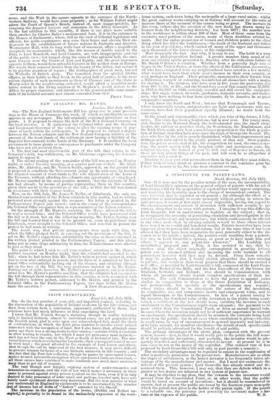A SUBSTITUTE FOR PATENT - LAWS.
North Brixton, 9th July 1851.
Sin—If it were not for the peculiar nature of the case, the incompatibility. of Lord Granville's opinions on the general subject of patents with his act of introducing a bill for the perpetation of a patent-law would appear surprising, and would lay his Lordship open to the charge of inconsistent conduct. The ease, however, may be regarded as sui geueris ; for although the effect of a patent-law is undoubtedly to create monopoly without giving in return the quid pro quo, it seems at first sight almost impossible, having due regard to the encouragement and reward of invention with sufficient security to in- ventors, altogether to do away with patents. I imagine it was this difficulty Lord Granville felt in undertaking to legislate on the subject ; that is, he recognized the necessity of generating cumulation and investigation in the several branches of art and manufacture, but which could scarcely be effected in any other mode than by offering, suitable reward to those whose labours have issued in successful and beneficial results. Patents heretofore have been supposed alone to possess this desideratum, but at the same time it has Una allowed that they have been inoperative for good generally either to the in- ventor or to the public ; indeed, the positive evils resulting from a patent- law are, in Lord Granville's opinion, so great as to have made hun and
others " opposed to any patent-law whatever." His Lordship has nevertheless proposed one. Now, it has occurred to me, that by
another plan the object originally contemplated in granting letters- patent can be attained without also incurring the evils incident to all patent-laws however well they may be devised. From these remarke it may be gathered, that I would abolish altogether the laws relating to patents, and would in their stead propose that there should be created a new office, as provided by Lord Granville's bill, composed of the Lord Chan- cellor, the Master of the Rolls, and the first Law-officers of the Crown for England, Scotland, and Ireland ; who should be Commissioners with whom all inventors should deposit complete specifications of their in- ventions. The said Commissioners to have the power to appoint juries similar in composition to those at the Great Exhibition of Industry, not permanentiv, but specially as the specifications may require; whose duties should be to investigate the nature of the invention, its originality, use, and comparative merits and consequent value, and to report thereupon to the Commissioners. In lieu of a patent issuing to the inventor, the beneficial value of the invention to the public being ascer- tained, a certificate of time fact should issue, entitling the inventor to such emolument as the Commissioners might deem adequate ; the payment to be made either from the Consolidated Fund, or from an annual special vote. In cases where the invention might not be of sufficient importance to warrant an emolument, the specification should be returned, the contents being kept secret from the public : but in all cases where emolument is given—whether in small sums, by way of encouragement to general ingenuity and industry, or in large amount, for manifest excellence--the details of such specifications should be publicly advertised for the benefit of said public. The primary advantages of the above plan, compared with the present system, consist—first, in that it would really give to the public the full bene- fit of truly valuable inventions ; and secondly, the inventor would be ade- quately benefited and sufficiently stimulated to invent. At present he is in nine eases in ten at the mercy of the capitalist. (The reduced rate of fees proposed by Lord Granville's bill will only in part provide a remedy.) The secondary advantages may be regarded to consist in the suppression of what is positively pernicious in the patent-law. Manufacturers are as often the dupes of adventurers, as the honest inventor is too frequently taken ad- vantage of by the manufacturer and master. But I need not enumerate the defects of the present system ; Lord Granville has already stated and de- nounced them. This, however, I may say, that they are defects which in a greater or less degree are inherent in any system of patent-law. It may be objected to my plan, that the rewards to the inventors would proceed from the Consolidated Fund, or, in other words, that the public would be taxed on account of inventions: but it should be remembered in answer, that at present the public are taxed by the fourteen-years monopoly which the patent-law gives to the holder of the patent right. If the patent be a valuable one, the patentee (not generally the inventor) makes a /fors


























 Previous page
Previous page